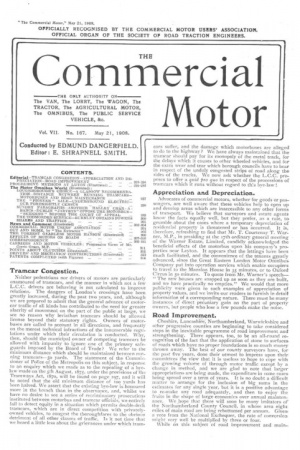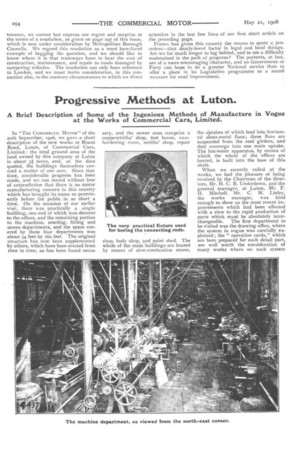Tramcar Congestion.
Page 1

Page 2

If you've noticed an error in this article please click here to report it so we can fix it.
Neither pedestrians nor drivers of motors are particularly enamoured of tramcars, and the manner in which not a few L.C.C. drivers are behaving is not calculated to improve relations. The dangers of London's crossings have been greatly increased, during the past two years, and, although we are prepared to admit that the general advance of motorcar traffic of all kinds has contributed to the need for greater alacrity of movement on the part of the public at large, we see no reason why leviathan tramcars should be allowed license beyond their statutory rights. Owners of motorbuses are called to account in all directions, and frequently on the merest technical infractions of the innunierable regulations under which their circulation is conducted. Why, then, should the municipal owner of competing tramcars he allowed with impunity to ignore one of the primary safeguards imposed by the Board of Trade? We refer to the minimum distance which should be maintained between running tramcars--5o yards. The statement of the Comrni:sioner of Police of the Metropolis on this subject, in response to an enquiry which we made as to the repealing of a byelaw made on the 5th August, 1875, under the provisions of th.2 Tramways Act, 1870, will be found on page 297, and it will be noted that the old minimum distance of too yards has been halved, We assert that the existing bye-law is honoured more in the breach than in the observance, and, whilst we have no desire to see a series of recriminatory prosecutions instituted between motorbus and tramcar officials, we entirely fail to detect equity in a situation which permits double-deck tramcars, which are in direct competition with privatelyowned vehicles, to congest the thoroughfares to the obvious detriment of all other classes of traffic. Is it not time that we heard a little less about the grievances under which tram cars suffer, and the damage which motorbuses are alleged to do to the highway? We have always maintained that the tramcar should pay for its monopoly of the metal track, for the delays which it causes to other wheeled vehicles, and for the extra wear and tear which borough councils have to bear in respect of the unduly congested strips of road along the sides of the tracks. We now ask whether the L.C.C. proposes to offer a quid pro quo in respect of the processions of tramcars which it runs without regard to this bye-law
Appreciation and Depreciation.
Advocates of commercial motors, whether for goods or passengers, are well aware that these vehicles help to open up and develop areas which are inaccessible to any other forms of transport. We believe that surveyors and estate agents know the facts equally well, but they prefer, as a rule, to grumble about the cases where a temporary depreciation of residential property is threatened or has occurred. It is, therefore, refreshing to find that Mr. T. Courtenay T. Warner, M.P., in presiding at the 17th ordinary general meeting of the Warner Estate, Limited, candidly acknowledged the beneficial effects of the motorbus upon his company's properties near Leyton. It appears that the lettings have been much facilitated, and the convenience of the tenants greatly advanced, since the. Great Eastern London Motor Omnibus Company put into operation services which enable occupiers to travel to the Mansion House in 35 minutes, or to Oxford Circus in 50 minutes. To quote from. Mr. Warner's speech" The new houses are snapped up as soon as they are built, and we have practically no empties." We would that more publicity were given to such examples of appreciation of property values, and we invite our readers to furnish in detail information of a corresponding nature. There must be many instances of direct pecuniary gain on the part of property owners, but people who lose a few pounds make the noise.
Road Improvement.
Cheshire, Lancashire, Northumberland, Warwickshire and other progressive counties are beginning to take considered steps in the inevitable programme of road improvement and strengthening. There appears, too, to be an all-round recognition of the fact that the application of stone to surfaces. of roads which have no proper foundations is so much money thrown away. The best of our county surveyors have, for the past five years, done their utmost to impress upon their committees the view that it is useless to hope to cope with the growing volume of through motor traffic except by a change in method, and we are glad to note that larger appropriations are being made, the expenditure in some cases being spread over a term of years. It is no doubt a difficult matter to arrange for the inclusion of big sums in the estimates for any single year, but it is a positive advantage to re-make any road adequately, and then to enjoy the fruits in the shape of large economies over annual maintenance. We hope that there will soon be many imitators of the Northumberland County Council, in whose area eight miles of main road are being rebottomed per annum. Given, a vote from the National Exchequer, the rate of conversion might very well be multiplied by three or four.
While on this subject of road improvement and main-. tenance, we cannot but express our regret and surprise at the terms of a resolution, as given on page 297 of this issue, which is now under consideration by Metropolitan Borough Councils. We regard this resolution as a most bare-faced example of begging the question, and we should like to know where it is that tramways have to bear the cost of construction, maintenance, and repair to roads damaged by competing vehicles. The resolution can only have reference to London, and we must invite consideration, in this connection also, to the contrary circumstances to which we direct attention in the last few lines of our first short article on the preceding page. France has given this country the means to quote a precedent—that dearly-loved factor in legal and local doings. Are we for much longer to lag behind, and to see a difficulty maintained in the path of progress? The portents, at last, are of a more encouraging character, and no Government or Party can hope to do a greater National service than to allot a place in its Legislative programme to a sound measure for road improvement.






















